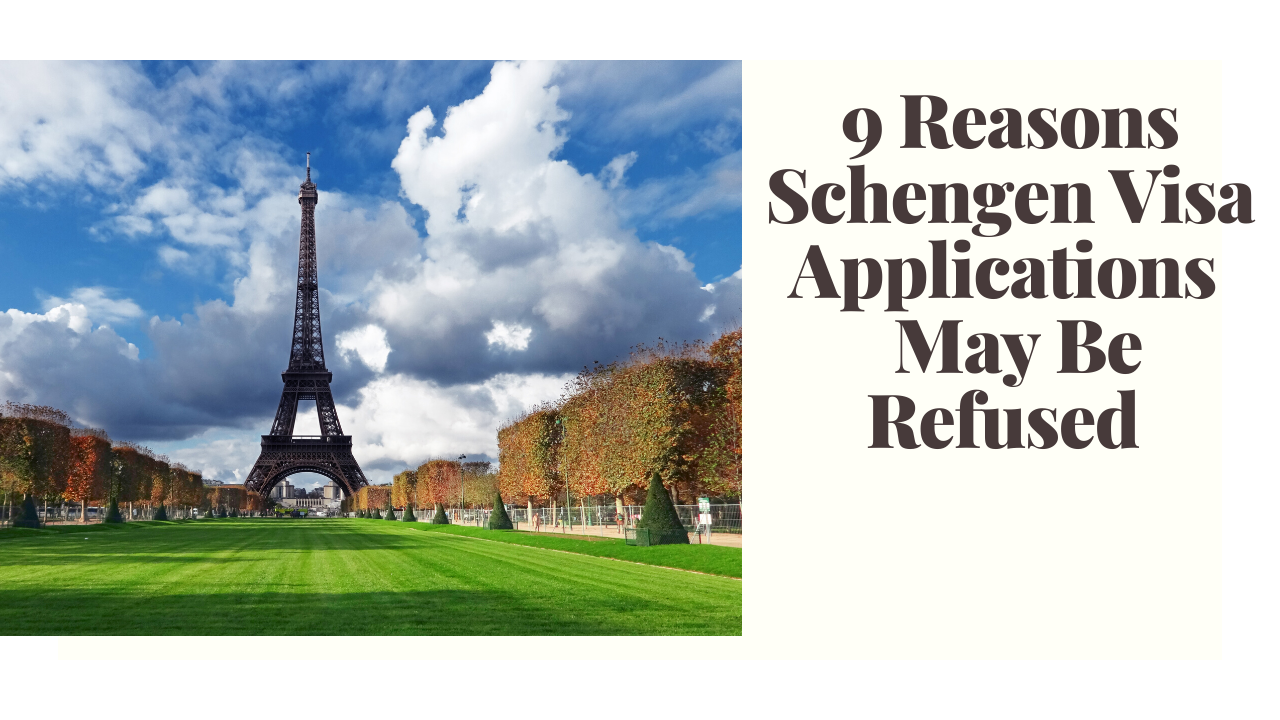
One of the most frequently asked question here on the EvaMtalii blog is why a Schengen Visa application was denied. So it only makes sense for me to address this issue today.
Getting your Schengen visa application denied may seem like a small matter but believe you me it is not especially if you’re planning many more future travels.
This is because it remains permanently in your record – not only within the Schengen territory countries – but also in other jurisdictions whereby each time you will apply for a visa for their respective countries they will always ask you if you’ve ever been denied a visa before by any other country.
It therefore makes sense for me to talk about these top Schengen visa application refusal reasons and suggestions of what to do about them.
This article is not only helpful for a first time Schengen visa applicant but also for if you are reapplying after your Schengen visa refusal.
But first, a disclaimer:
I CANNOT guarantee that your Schengen Visa application through the Switzerland Embassy in Nairobi, Kenya or whatever embassy in the world you’re applying through, will be approved by following this guide to a T. Getting a visa or not is at the sole discretion of the particular Schengen Territory Embassy consular officer who will attend to your visa application.
All I am offering here is reasons that were given to actual applicants whose Schengen short-term tourist visa applications were denied and in some cases, the exact reasons that the respective embassies gave as reason for denial. It therefore doesn’t apply for other long-term types of visa such as fiance, marriage, immigration, etc.
Okay, since we’ve taken care of that, let’s move on…
Top 9 reasons for Schengen visa refusals
What's Covered in This Article [hide]
1. Presenting a fake or counterfeit or forged travel document
2. Justification for the purpose and conditions of the intended stay was not provided
This basically means that you have not presented clear documented evidence of “why you want to visit the said Schengen territory” and “details of where you will be staying and how you will be funding your stay”.
Work around:
Submit all the relevant verifiable documentation from your sponsor if trip is sponsored
If your trip to the Schengen country is being sponsored for instance, you must provide verifiable documentation from your sponsor such as:
- A letter from your sponsor clearly stating: what part of your trip expenses they will take care of while you are in the Schengen country destination: e.g. your round trip ticket, food, accommodation, transport, etc
- If sponsor is an individual, include sponsor’s bank statements for the last 3 months clearly indicating their monthly salary deposits or business income
- If sponsor is an individual, include sponsor’s Schengen country passport’s bio-data page
- If sponsor is an individual, include sponsor’s Schengen country utility bill
etc.
Submit documents that ascertain your purpose of visit
Schengen visa application forms don’t usually have too much space for you to explain yourself.
This is where a detailed cover letter for Schengen visa application comes handy. Use it to your advantage to make a case for your non-immigrant intentions.
In your Schengen visa cover letter include details of your purpose of travel, proposed itinerary, your economic circumstances, your past travel history, your intention to return to your home country at the end of your trip, etc. Make your letter simple and crisp.
If traveling for a conference for instance, make sure to include the conference invitation letter
If you’re employed, make sure to include your employer’s recommendation letter clearly indicating that you are their employee, your salary, your position, and that they have authorized your leave of absence for (your stated purpose of travel) and that you will be returning to work with them at the end of your trip.
Substantiate with adequate documentary evidence the existence of a family relationship
If you indicate in your Schengen visa application that you will be visiting a relative or that they will be sponsoring your trip, make sure to give documented evidence of your family relationship. Otherwise your Schengen visa can be refused on the basis of failure to give documentary evidence of this relationship.
Some of the documents you can attach to substantiate your relationships include:
- birth certificates
- marriage certificates
- child adoption certificates, etc.
If your trip is self-sponsored, you must have your hotel bookings.
Align your requested duration of stay with your leave entitlements
This one is pretty straight forward.
If let’s say you request for a Schengen visa through the French embassy in Kenya for instance and indicate that you will be vising from 18th January 2020 to 31st January 2021, make sure to include your employer’s recommendation letter clearly indicating, among other things, that they have authorized your leave of absence (from 18th January 2020 to 31st January 2021) and that you will be returning to work with them at the end of your trip.
Explain reasons for not having used any previous visas granted on the invitation of the same host
Let me explain. Let’s say your sister lives in Switzerland and she invites you to visit here this Christmas. So she writes you a Schengen visa sponsor letter to enable you apply for a Schengen visa through the embassy of Switzerland in Kenya and fortunately you get your visa approved. But for some reason, you decided not to travel.
Now, let’s say the following year the same sister invites you to Switzerland.
This is another circumstance whereby your cover letter comes handy. Make sure to mention that you had previously been issued a visa on the the invitation of the same host (your sister) but you were unable to use the visa to enter the given Schengen territory or state, and give a reason as to why.
Failure to do so could lead to your Schengen visa being denied on the basis that “the previous visas granted on the invitation of the same host have not been used to enter the given Schengen territory or state, although the visas have been given for this purpose”.
Make sure that your flight and hotel reservations for the visa application are valid throughout your visa submission process
One of the requirements for submitting a Schengen visa application is to submit a round trip flight reservation and hotel reservation (if not being hosted by someone else in the destination country).
Now, one advise given by most embassies as well as by me, is not to pay for a ticket until you get the visa stamped on your passport. Reason being that most affordable tickets are non-refundable. So if your visa is denied, you lose all that money. On the other hand, refundable tickets come at a premium and most will charge you a cancellation fee of at least US $150.
It therefore makes most sense to make flight reservation for your Schengen visa application without paying for the actual flight ticket. With careful planning, you can get a flight itinerary reservation to show visa officials for a Schengen visa application without having to pay for the flight and I outline the various options in this post here (click to open)

Same case applies to hotels. I prefer using online aggregation sites e.g. AirBnB, Booking.com, etc. I love Booking.com as it has much more hotel selections that offer free cancellation options before a certain date and don’t ask for pre-payment.
The advantage with AirBnB on the other hand is that you can negotiate with your host and also most properties have cancellation options.
This is particularly important in the unfortunate event that your Schengen visa is denied. Its also advantageous in that the visa may be granted all the same, but your circumstances change and you want to change hotels without cost implications.
Whatever option you decide to go by, my personal recommendation is to go for the option which gives you surety that by the time your Schengen visa application is being attended to, the flight and hotel reservations you submitted are still valid and will not have been canceled.
3. You have not provided proof of sufficient financial capability
Basically you need to show documented evidence that you have sufficient resources to fund not only traveling to your destination Schengen country, but also take care of yourself for the duration of your intended stay as well as for when you return back home to your country of origin or residence, or for the transit to an onward destination.
Failure to provide this information can lead to your visa being denied on grounds of “providing no or insufficient evidence for having the financial means of subsistence for the duration of your stay”.
Work around:
To work around this, you will need to give evidence of a means of subsistence or evidence of being in a position to acquire such means lawfully e.g. through:
- Recent 3 months pay slips
- Certified personal bank statement for the last 3 months clearly indicating how your salary has been coming in.
- If trip is sponsored, letter of sponsorship and their bank statement for the last 3 months
- If self – employed (Pin Certificate, Registration Certificate/Business Licence) and a certified business bank statement for the last 3 months
4. Having already stayed for 90 days within the current cumulative 180-day period
Generally, a Schengen tourist visa policies only allow the visa holder to stay in the Schengen-Area territory of the member states for 90 days within a period of 180 days on the basis of a uniform visa or a visa with limited territorial validity.
Therefore, if lets that between January 2019 and April 2019 I visited France for 30 days, Switzerland for 30 days, Sweden for 40 days, then I made a visa application for 3 months in May 2019, my application is likely to be denied on two grounds:
- The validity of the requested visa would exceed the maximum period of time of 90 days within a cumulative 180 days period.
- I have already stay in the Schengen area for 100 days which is longer than the 90 days allowed within a cumulative 180 days period.
Work around:
Wait for the 180 days to lapse (unless of course you have a valid reason – e.g. medical, etc) and of course do not attempt to break the 90-day during the current 180-day period policy.
5. An alert has been issued in the Schengen Information System (SIS) for the purpose of refusing entry
The Schengen Information System (SIS) is the most widely used and largest information sharing system for security and border management in Europe.
Thus, a Schengen visas application can be denied for this reason when an applicant has a negative entry in the SIS for whatever reason.
Unfortunately, for long as your name remains as a negative entry in the SIS, it is usually not possible to be granted a Schengen visa.
Work around:
- The most obvious work around is to try as much is in your power to behave in a manner to reduces chances of getting your name negatively entered on the SIS
- The next obvious one is to work with the respective authorities to find out why your name is listed and how to get the negative entry out of SIS
6. One or more member state(s) consider you to be a threat to public policy, internal security, public health or the international relations of one or more of the member states
According to Article 2(19) of Regulation (EC) No 562/2006 (Schengen Borders Code) your Schengen visa application is likely to be denied on grounds of being a threat to the public policy, internal security, public health or the international relations of one or more of the member states if:
- they have submitted fake or false documents and / or have made contradicting statements.
- they have attempted to lie or be dishonest
- they have a negative entry in the AZR (Central Register of Foreigners).
Unfortunately, just like having a negative entry in the SIS above, as long as you have a negative entry in the AZR, it is nearly impossible to be granted a Schengen visa.
Work around:
- Do not submit fake or falsified documents
- Be truthful and straightforward
- The next obvious one is to work with the respective authorities to find out why your name is listed and how to get the negative entry out of AZR
7. Not providing proof of having an adequate and valid travel medical insurance
One of the mandatory requirements when submitting a Schengen visa application is valid travel medical insurance that covers your entire duration of stay in the Schengen area including entry and exit day.
Failure to submit this can lead to your application being denied.
Work around:
Purchase and submit with your application international travel insurance (can be purchased locally or in the destination Schengen country).
The insurance certificate must clearly outline proof of coverage of a minimum coverage sum of EUR 30’000 / USD 50’000 / CHF 50’000 – to cover expenses for personal accident, urgent medical treatment, urgent admission in a hospital or urgent repatriation on medical grounds; with coverage including ALL Schengen member states.
8. The information submitted regarding the justification for the purpose and conditions of the intended stay was not reliable
Schengen visa applications are usually denied for this reason in circumstances whereby the applicant makes contradictory statements on their purpose of stay.
For example your employer cover letter says you’re going for a conference, your application form says you’re going on a vacation, and you have an sponsorship letter from your sister saying you’re visiting her for Christmas.
Of course I’m exaggerating a little
My point though, you may be vising France for all the 3 reasons giving above. However, there is one main reason why you’re visiting. So let’s say you were going for the business trip but would like to take an extra 5 days to tour Paris, mention the business trip as your main purpose of travel then in your cover letter say you have taken 5 days extra leave days to tour. And make sure your employer letter includes all these details.
Work around:
Be consistent and avoid introducing too many relationships in your application.
9. Your intention to leave the territory of the member states before the expiry of the visa could not be ascertained
The moment you submit your visa application, you’re instantly presumed to have immigrant intentions until such a time that you establish, to the satisfaction of the consular officer, at the time of application for the visa, and the immigration officers, at the time of application for admission, that you are entitled to a non immigrant status.
Thus, the honors is on you to make sure that the documents and your other information that you submit are sufficient to build a case for your non-immigration intent and that you intend to return back to your home country of country of legal residence at the end of your intended trip.
Work around:
- Submit documented evidence for any family ties to your home country e..g. marriage certificate for spouse, birth certificate for minor children, legal adoption papers for guardian-unions etc.)
- Submit documented evidence for any professional ties to your home country or country of legal residence (e.g. letter of employer to show existence of a fixed employment relationship)
- Submit documented evidence for any economic ties to your home country or country of legal residence (e.g. certified recent 3 months personal bank statements, recent 3 months payslips or business statements showing regular income from business rents or real estate assets, title deeds, car log books, etc)
- Submit letter of employer to clearly showing when you were hired, your salary, your position, leave days granted and that you will come back, your passport number, etc. to establish and confirm the employment relationship.
- Never over stay of a past Schengen-Visa visit
- Clearly indicate in your current visa application any changes in the personal situation since the granting of the last Schengen-Visa
Well, I hope this list will guide you in your application whether as a first time Schengen visa applicant or whether you are reapplying after your Schengen visa refusal.
Kindly note that this list just highlights the most common causes of a Schengen visa refusal based on actual refusal letters and should thereofre not be taken as exhaustive list as there could be other reasons that I am not aware of..



